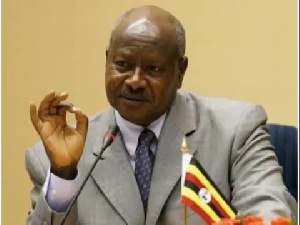Uganda’s President Yoweri Museveni, who is also the chairman of the ruling National Resistance Movement (NRM), recently launched the update of the party’s voters’ register, sending a strong signal that he will be seeking a seventh term in 2026.
The president renewed his party membership and signed the dummy register to mark the launch of the exercise, in which the party hopes to add more members to the 11 million faithful it has, starting next week.
The president’s making it a big deal out of it signalled the launch of his bid for a seventh term, after keeping the country guessing on whether he will contest or back his son, Gen Muhoozi Kainerugaba, for the top seat.
“NRM is a party that came with a principle of understanding people’s needs, which have got a potential solution, but it has not been identified or, if identified, implemented,” he said after the launch.
Senior presidential advisor on political affairs, Hajat Hadijah Namyalo, while meeting party leaders, district chairpersons, and registrars, urged for support President Museveni’s bid for re-election, while the party Electoral Commission chairman Dr Tanga Odoi said the President is the only NRM flag-bearer for the 2026 election, ending speculation and any doubts about the NRM candidate at a time some politicians had started pushing for Gen Muhoozi to carry the flag.
NRM Secretary-General Richard Todwong asked the President to continue his leadership.
“As a party, we are committed to make sure that you continue with your legacy and good deeds and we pledge before everybody that the party is still asking for your goodwill to offer yourself in 2026,” he said.
Meanwhile, in the opposition camp, there seems to be no clear challenger, with four-time presidential candidate and former Forum for Democratic Change President, Dr Kizza Besigye, heading back to the grassroots to consult on whether he should form a new party, a decision he hopes will be made in the coming two months after the nationwide meetings that started this week.
The chaos in FDC, which he formed and led for several years, did not allow for reconciliation after the party members accused the leaders of receiving money from President Museveni to weaken the party during the 2021 presidential and parliamentary elections, allegations that broke the party into two factions.
In the National Unity Platform, the party that sent shockwaves in the ruling party after defeating it in nearly all constituencies in the Central region — the heart of the country that hosts even the capital Kampala — during the 2021 elections, the fault lines that started forming a few months back are widening more.
Party leader Robert Kyagulanyi is fighting to dislodge the former leader of the opposition in Parliament, who is also the party’s deputy president for Buganda region, from a parliamentary position.
He says Mathias Mpuuga, who received Ush500 million ($128,635) of the Ush1.7 billion ($437,360) shared out among five commissioners, including Speaker Anita Among, as “service award,” should resign from the commission, for allowing to partake in the abuse of office, misuse of public funds and blatant wastage of public funds.
Kyagulanyi, as the leader of the party with the majority of opposition members in parliament appointed the leader of the opposition and recently replaced Mr Mpuuga with Joel Ssenyonyi, in what political observers termed as the culmination of a protracted conflict between the two leaders. Mr Kyagulanyi says Mpuuga had been called to explain the sharing money at Parliament and that he regretted the actions, apologised, and promised to consult before stepping down.
“We all know that a matter involving huge sums of money, which is not legislated but a matter of negotiation normally involves give and take. The people of Uganda would love to know what Mpuuga gave in exchange for this big favour,” Kyagulanyi said.
But Mr Mpuuga did not come back to explain and rejected the call to resign. While appearing on a radio talk show last Saturday, he said he has no regrets for getting the money and won’t resign.
He accused Kyagulanyi of dictatorial tendencies and wondered how he would conduct himself if he got state power; where he could access guns, power, and authority. He described the NUP boss as an inexperienced leader, scared of his popularity and experience and sees him as a threat.
“The campaign to assassinate my character is deliberate. It’s well-orchestrated and well-funded. I am ready for the worst, if it takes this sacrifice to return sanity and common sense to our politics,” Mpuuga said. “I decline the cowardly call on me to resign as a parliamentary Commissioner, based on spite, and deliberate misrepresentation for mischievous reasons.”
But President Museveni keeps clear of the fights and accusations and waits for the right moment to reassure the public that he is their saviour from bad leadership from within or outside his party.
Mpuuga said the decision to award him and other commissioners the money was not an individual decision but by the commission of which he is a member.
“The decisions of the commission are not personal but collective in nature, and for anyone to purport to make their personal decisions of an individual is a deliberate, well-crafted malicious campaign designed for character assassination,” Mpuuga argued.
But President Museveni keeps clear of the fights and accusations and waits for the right moment to reassure the public that he is their saviour from bad leadership from within or outside his party.
There has never been a time more right for Museveni to get a resounding win than 2026 when all political parties either have been silenced or are engaged in internal battles.
Africa News of Saturday, 9 March 2024
Source: theeastafrican.co.ke

















